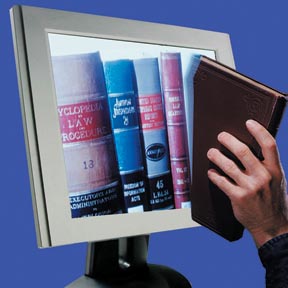Bringing it to your desktop and your door: Access to scholarly resources keeps getting easier
By Anne R. Kenney

It's Sunday night and you're trying to finish an article that your editor needs by Friday.
There are a couple of older references that you need to consult, but you can't get to the library until Wednesday. Firing up the Cornell Library Gateway, you check to see if any sources are available online.
You find the full text of one article available electronically through JSTOR, the scholarly journal archive, which has digitized the back holdings of more than 600 journals in the arts, humanities and social sciences.
Another article is in a print journal that's stored at the Library Annex, where it is scanned and also delivered to you electronically.
Delivery time for both sites: 24 hours or less.
The final citation is to an out-of-print book published by Princeton University Press in 1984. You discover that this monograph is available electronically through the American Council of Learned Societies' History E-Book Project, which has digitized 1,000 scholarly monographs reviewed in the American Historical Review.
By Monday night you have made full use of the library without actually visiting it.
As this example shows, Cornell University Library has worked hard to improve document delivery services, enabling users to access current and older materials at their place and time of convenience. Among the services added over the past two years are:
Electronic document delivery. Request copies of journal articles, book chapters and other materials in the print collection to be scanned and made available on the Web as PDF files. The service is free for materials stored in the Annex and for a modest fee from other library units.
Library-to-library delivery and return. Request a volume to be delivered to the library most convenient to you and return it to another location when you are done. Requests are made electronically via the Library Gateway.
Enhanced interlibrary loan capabilities. Two new services expedite delivery of materials from non-Cornell libraries. The first is Borrow Direct. Search the combined library catalogs of Brown, Columbia, Cornell, Dartmouth, University of Pennsylvania, Princeton and Yale -- a collection of over 40 million volumes -- and directly request expedited delivery of circulating items. Most items will be available within four working days. Interestingly, this service is used heavily to obtain books that Cornell Library owns but are checked out to other patrons. The second service is called RAPID, a speedy article delivery service that offers electronic copies of articles not owned by Cornell, with a 24-hour turnaround time.
Soon the library will be rolling out additional services to facilitate the demand for scholarly resources. Later this fall, faculty members will be able to request delivery of books to their academic departments free of charge. The library is also making the faculty loan period indefinite. That means that academics will be able to check out a book out for as long as they remain on the faculty, subject only to recall by another patron.
Also in the works is a simplification of various delivery options. Within the next year or so library patrons will be able to click a "Get it" button on the Library Gateway and have the library do all the behind-the-scenes work. And for those who start with a Web search, Cornell's online catalog is searchable via Google Scholar and Yahoo!.
Why is the library focusing so much attention on these services? First, they have been requested. In library surveys or during casual conversations, faculty members have commented on the importance of convenient services. And statistics show there is a high correlation between use and ease of use. Access to digitized resources dwarfs the use of physical versions and breathes new life into older materials.
Interlibrary borrowing increased 35 percent the year the library introduced Borrow Direct; more than 10,000 books were requested in the first nine months of library-to-library book delivery. Analysis of this service indicates that faculty and students are relying on materials from a great variety of libraries within the system, and the service is supporting cross-disciplinary research.
Second, time is money, and faculty time is precious. By expediting access to, and use of, scholarly resources, the library is supporting faculty members in using their time to do research and teaching.
Finally, it is the library's mission is to serve the research, teaching and learning needs of the Cornell community.
Anne R. Kenney is associate university librarian for instruction, research and information services. She can be contacted at ark3@cornell.edu.
Media Contact
Get Cornell news delivered right to your inbox.
Subscribe